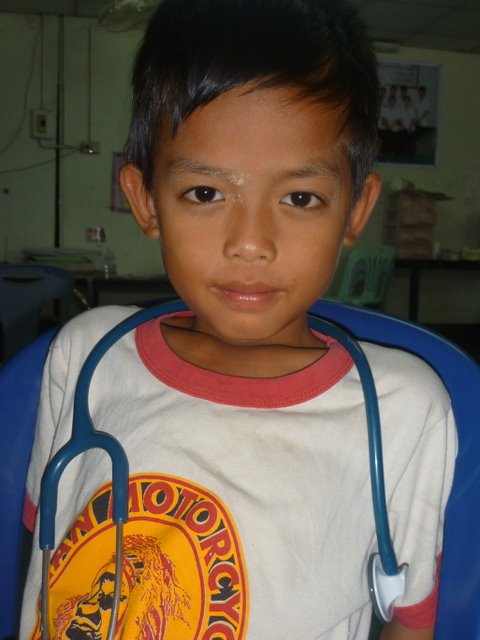Khaing (imperforate anus)
July 20, 2011 • Posted in BCMF Success stories
KHAING’S MEDICAL AND FAMILY HISTORY:
Khaing was born at home in a village in Burma with the help of a Traditional Birth Attendant (TBA). On closer inspection, she noticed that Khaing did not have an anus, a condition called imperforate anus. The next day, his family took him to a nearby hospital and he underwent emergency surgery to open a hole in his abdominal wall so that he could pass stool (colostomy). The doctors asked his parents to take him to Rangoon Hospital for another operation to create an anus.
As instructed, Khaing had surgery at Rangoon Hospital to open his anus – an incision was made and his rectum was pulled down and ano-rectoplasty performed. Khaing now has a scar near his anus but the surgery was not successful because his family could not afford the follow-up treatment to dilate the new opening and reverse the procedure. In Burma, hospitals charge for everything – from surgical gloves used during procedures to syringes and electricity. To pay for the surgery, Khaing’s father had to sell some of his cows.
Khaing’s father is a farmer and he harvests rice paddy during wet season and grows peanuts during dry season. He works collectively with other farmers and at the end of the harvest he earns a portion of the value of the crop he harvests. He earns enough money that Khaing and his siblings are all able to attend school. However, sometimes he does not earn enough and they are forced to sell livestock and possessions to make ends meet.
In early 2010, Khaing was sent to a remote refugee camp in Thailand to live with his aunty. He now attends school in camp and is in first standard. After having lived all his life with a colostomy, his aunt took him to the clinic in the camp to see if they were able to commence the treatment Khaing needed to reverse the procedure and lead a normal life. The treatment was not available in the camp and Khaing’s aunt then sought treatment at the Mae Tao Clinic. Upon his arrival at the clinic, it was evident that if Khaing was to be treated, he would need to go to Chiang Mai. He was referred to the Burma Children Medical Fund (BCMF) program and his father came from Burma to be with Khaing and to accompany him to Chiang Mai.
Before his surgery, Khaing said that he could play with his friends without feeling any pain. However, sometimes his friends teased him and call him “smelly”. Khaing said that he really wanted to be like other children. His father said that without treatment, his son would have to live with a colostomy for the rest of his life.
TREATMENT:
Khaing and his father went to Chiang Mai twice.On 22 February 2011, Khaing had surgery to reverse his colostomy. His father said that Khaing recovered very quickly after the surgery. Khaing says that he wasn’t scared at all when he went for surgery.
Khaing says that he feels much better than before. Prior to the surgery he was very shy. If he wanted play with his friends, they would always tell him that he smelled bad and not to play with them. Khaing no longer has to afix a make-shift colostomy bag over the opening in his stomach as he now has a nice, neat scar.
Khaing’s father said that his son is much happier than before and that he no longer has to worry about his son.
Khaing and his father are close. Khaing has grown up in the jungles of Karen State and he likes hunting with a sling-shot. His father taught him how to hunt and Khaing is skillful with his sling-shot. They live in a village of about five hundred household. There has been a lot of fighting in near their village recently and they are afraid of the different military groups who come to their village. Every month they have to pay money to their village chief to buy their safety. It is for this reason that Khaing’s father believes his son would be better off living and being educated in a refugee camp in Thailand.
THE FUTURE:
Khaing has complete grade one of schooling and will attend school at a refugee camp in northern Thailand. Many people in their village send their children to the refugee camps in Thailand because they will have a better opportunities their than if they stay in their native land. Many people don’t have enough money to send their children to school in Burma and the education is better in the refugee camps. It takes them one day and one night by public vehicle to get to the refugee camp from their village.
Khaing says that he wants to be a doctor when he grows up. He says that if you are a doctor, you can get a good income and you can help people. He loves his father very much but he doesn’t want to be a farmer. Khaing’s father is grateful to everyone who helped facilitate the treatment for his son. He hopes that BCMF’s supporters can help other children like his son, Khaing. ->>> how to donate


